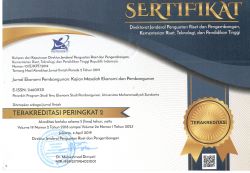Internet Use and Agricultural Household Food Insecurity in Indonesia
Dela Maria Ardianti(1), Djoni Hartono(2*)(1) Graduate Program in Economics, Faculty of Economics and Business, Universitas Indonesia
(2) Department of Economics, Faculty of Economics and Business, Universitas Indonesia
(*) Corresponding Author
Abstract
Keywords
Full Text:
PDFReferences
Abdullah, Zhou, D., Shah, T., Ali, S., Ahmad, W., Din, I. U., & Ilyas, A. (2019). Factors affecting household food security in rural northern hinterland of Pakistan. Journal of the Saudi Society of Agricultural Sciences 18, 201-210. doi:http://dx.doi.org/10.1016/j.jssas.2017.05.003
Anwar, M., & Nasrudin, R. (2021). The Household Food Insecurity Amidst the Covid-19 Pandemic in Indonesia. Journal of Economics and Policy vol 14 (2), 244-260. doi: https://doi.org/10.15294/jejak.v14i2.28511
Ariansyah, K. (2018). The Importance of the Internet on Improving Economic Welfare: An Empirical Evidence from Indonesian Rural Household. International Conference on ICT for Rural Development: Rural Development through ICT: Concept, Design, and Implication, IC-ICTRuDEv 2018, 118–123.
Asghar, Z., & Muhammad, A. (2013). Socio-economic Determinants of Household Food Insecurity in Pakistan. MPRA paper no. 21510. doi:https://mpra.ub.uni-muenchen.de/21510/
Chang, H.-H., & Just, D. R. (2009). Internet Access and Farm Household Income – Empirical Evidence using a Semi‐parametric Assessment in Taiwan. Journal of Agricultural Economics vol. 60 no. 2, 348-366. doi:10.1111/j.1477-9552.2008.00189.x
Deng, X., Xu, D., Zeng, M., & Qi, Y. (2019). Does Internet use help reduce rural cropland abandonment? Evidence from Land Use Policy Does Internet use help reduce rural cropland abandonment? Evidence from China. Land Use Policy vol. 89. doi:https://doi.org/10.1016/j.landusepol.2019.104243
Ezeoha, A., Obi, A., Igwe , A., & Ezeruigbo, C. (2019). The mobile phone revolution, the Internet and rural electricity: What are the implications for food security in Africa? Information Development Vol.36 (4), 603-622. doi:https://doi.org/10.1177/0266666919884991
FAO, IFAD, UNICEF, WFP, & WHO. (2021). The State of Food Security and Nutrition in the World 2021. Transforming food systems for food security, improved nutrition and affordable healthy diets for all. Rome: FAO. doi:https://doi.org/10.4060/cb4474en
Faridi, R., & Wadood, S. N. (2010). An Econometric Assessment of Household Food Security in Bangladesh. The Bangladesh Development Studies vol. 33 No. 3, 97-111. doi:http://www.jstor.org/stable/23339854
Gurning, H. R., & Khaliqi , M. (2021). The Impact of Internet Access on Household Expenditure using the Matching Method. Economics and Business in Industrial Revolution 4.0, 542-548. doi:10.5220/0009314305420548
Hong, Y.-Z., & Chang, H.-H. (2020). Does digitalization affect the objective and subjective wellbeing of forestry farm households? Empirical evidence in Fujian Province of China. Forest Policy and Economics. doi:ttps://doi.org/10.1016/j.forpol.2020.102236
Ibnouf, F. O. (2011). Challenges and possibilities for achieving household food security in the Western Sudan region: the role of female farmers. Food Security volume 3, 215–231. doi:https://doi.org/10.1007/s12571-011-0118-3
Issahaku, G., & Abdulai, A. (2019). Can Farm Households Improve Food and Nutrition Security through Adoption of Climate-smart Practices? Empirical Evidence from Northern Ghana. Applied Economic Perspectives and Policy Vol O , 1–22. doi:10.1093/aepp/ppz002
Ma, W., Nie, P., Zhang, P., & Renwick, A. (2019). Impact of Internet use on economic well-being of rural households: Evidence from China. Rev Dev Econ., 1-21. doi: 10.1111/rode.12645
Maitra, C., & Rao, D. (2017). An Empirical Investigation into Measurement and Determinants of Food Security. The Journal of Development Studies. doi:10.1080/00220388.2017.1324144
Namubiru, M., Ngaka, W., & Picho, E. O. (2018). The Effect of ICT on Households’ Food Security in Uganda. Evidence from Acholi Sub Region in Northern Uganda. International Journal of Technology and Management vol. 3.
Oluwatayo, I., & Ojo, A. (2019). Effect of Access to ICT on Food Insecurity Among Farming Household in Nigeria. The Journal of Developing Area Vol.53.
Rahayu, B. I., & Riyanto. (2020). The Role of Mobile Phone and Internet Use in the Performance of Rural Non-Farm Enterprises: An Analysis of Indonesian Rural Households. Buletin Pos dan Telekomunikasi Vol. 18 No.1, 29-46. doi:10.17933/bpostel.2020.180103
Ronalia, P. (2021). Dampak Resiliensi terhadap kerawanan pangan Rumah Tangga di Indonesia. Universitas Indonesia.
Rusmawari, E., & Hartono, D. (2021). Food Security: The Role of Social Capital in Indonesia Rural Area. Economics Development Analysis Journal Vol (3). doi:https://doi.org/10.15294/edaj.v10i3.48442
Samim, S. A., Hu, Z., Stepien, S., Amini, S. Y., Rayee, R., Niu, K., & Mgendi, G. (2021). Food Insecurity and Related Factors among Farming Families in Takhar Region, Afghanistan. Sustainability vol 13. doi:https://doi.org/10.3390/su131810211
Siaw, A., Jiang, Y., Twumasi, M. A., & Agbenyo, W. (2020). The Impact of Internet Use on Income: The Case of Rural Ghana. Sustainabilty vol 12. doi:10.3390/su12083255
Sisha, T. A. (2020). Household level food insecurity assessment: Evidence from panel data, Ethiopia. Scientific African vol 7. doi:https://doi.org/10.1016/j.sciaf.2019.e00262
Sulaiman, N., Yeatman, H., Russell, J., & Law, L. S. (2021). A Food Insecurity Systematic Review: Experience from Malaysia. Nutrients 2021. doi:https://doi.org/10.3390/nu13030945
Twumasi, M. A., Jiang, Y., Asante, D., Addai, B., Boateng, S. A., & Fuso, P. (2021). Internet use and farm households food and nutrition security nexus: The case of rural Ghana. Technology in Society 65. doi:https://doi.org/10.1016/j.techsoc.2021.101592
Utama, I. R., & Waruwu, D. (2019). Investigation of Internet User Behaviour in Indonesia. Journal of Social Sciences and Humanities vol 9. Retrieved from ojs.pnb.ac.id/index.php/SOSHUM/
Xue, P., Han, X., Elahi, E., Zhao, Y., & Wang, X. (2021). Internet Access and Nutritional Intake: Evidence from Rural China. nutrients 13(6). doi:https://doi.org/10.3390/nu13062015
Article Metrics
Abstract view(s): 983 time(s)PDF: 866 time(s)
Refbacks
- There are currently no refbacks.
















